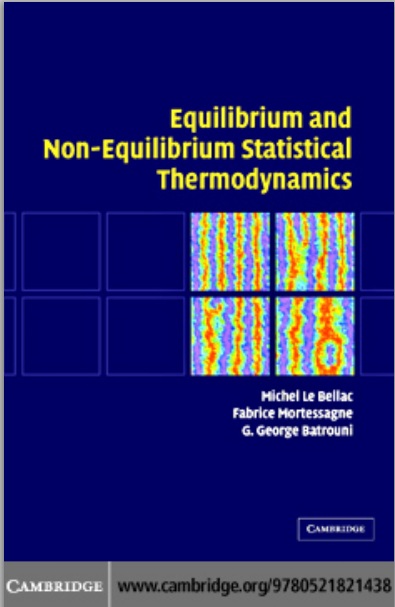Statistical Physics (PHYS552)

Course Materials: Syllabus
Course textbook:
M. LeBellac, F. Mortessagne, G.G. Batrouni, Equilibrium and Non-Equilibrium Statistical Thermodynamics, Cambridge University Press (2006)
Lecture Notes:
Lecture 1: Thermodynamics (Laws of thermo, Carnot cycle, entropy)
Lecture 1: Thermodynamics (work vs. heat, thermodynamics walls, equilibrium state)
Lecture 2: Thermodynamics (entropy, constraints, internal variables, heat engines)
Lecture 5: Equilibrium distribution, ensembles, fluctuation response
Lecture 6: Thermodynamics from the information entropy, entropy of mixing
Lecture 7: Canonical Ensemble: Application to the ideal gas
Lecture 7: Microcanonical and Canonical Ensembles: Application to paramagnets and the 1D Ising model
Lecture 8: Thermodynamic limit, Classical systems, Maxwell distribution
Lecture 9: Quantum statistical mechanics: canonical ensemble in the path-integral representation
Lecture 10: Liquids, pair distribution function, virial expression for pressure
Lecture 10: Chemical potential, phase equilibria, Gibbs phase rule
Lecture 11: Equilibrium at constant chemical potential, associated equal area construction
Lecture 12: Chemical reactions, grand canonical ensemble (brief intro)
Lecture 13: Critical phenomena, Ising model (D=1, D=2, Peierls argument), Lee-Yang theorem
Lecture 13: Correlation functions, Correlation length of Ising model in 1D, Symmetry breaking
Lecture 14: Critical exponents (definition), basic mean-field theory
Lecture 15: Goldstone modes, Ginzburg-Landau functional, second-order expansion, critical dimension
Lecture 16: Homogeneous functions, Widom scaling, Kadanoff scaling
Lecture 16: Basics of renormalization group theory
Lecture 17: Renormalization group example: triangular lattice
Lecture 17: Renormalization group in more detail: scaling transformations
Extra Lecture Notes:
Lecture 19: Ideal quantum gases, Ideal Bose gas
Lecture 19: Bose-Einstein condensation, Ideal Fermi-Dirac gas
Exams: